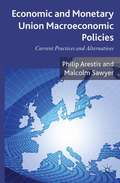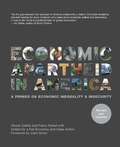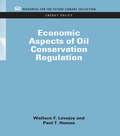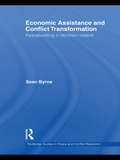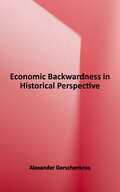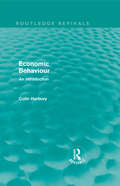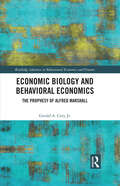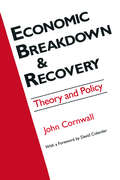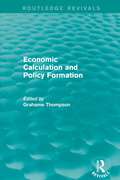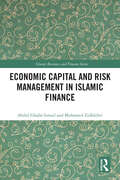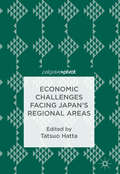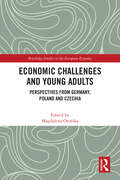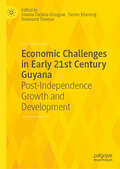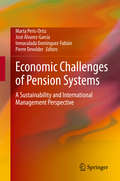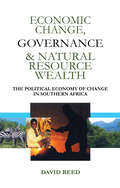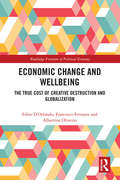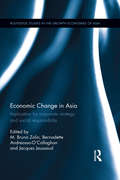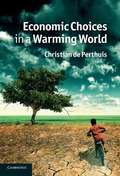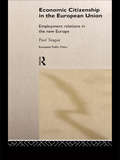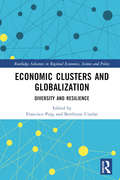- Table View
- List View
Economic And Monetary Union Macroeconomic Policies
by Philip Arestis Malcolm SawyerThis book focuses on the construction of the economic policies of the Economic and Monetary Union (EMU) and its institutions. It reviews the faltering economic performance of the EMU countries before and after the onset of the financial crisis.
Economic Announcements and the Timing of Public Debt Auctions
by Marco RossiA report from the International Monetary Fund.
Economic Apartheid In America
by Chuck Collins United for a Fair Economy Felice YeskelThis updated edition of the widely touted Economic Apartheid in America looks at the causes and manifestations of wealth disparities in the United States, including tax policy in light of the 2001 and 2003 tax cuts and recent corporate scandals.Published with two leading organizations dedicated to addressing economic inequality, the book looks at recent changes in income and wealth distribution and examines the economic policies and shifts in power that have fueled the growing divide.Praised by Sojurners as "a clear blueprint on how to combat growing inequality," Economic Apartheid in America provides "much-needed groundwork for more democratic discussion and participation in economic life" (Tikkun). With "a wealth of eye-opening data" (The Beacon) focusing on the decline of organized labor and civic institutions, the battle over global trade, and the growing inequality of income and wages, it argues that most Americans are shut out of the discussion of the rules governing their economic lives. Accessible and engaging and illustrated throughout with charts, graphs, and political cartoons, the book lays out a comprehensive plan for action.
Economic Aspects of Oil Conservation Regulation: Economic Aspects Of Oil Conservation Regulation (RFF Energy Policy Set)
by Wallace F. Lovejoy Paul T. HomanThis book traces the history and implementation of regulation programs for state crude oil production. Originally published in 1967
Economic Assistance and Conflict Transformation: Peacebuilding in Northern Ireland (Routledge Studies in Peace and Conflict Resolution)
by Sean ByrneThis book examines the role of economic aid in the management and resolution of protracted ethnic conflicts, focusing on the case study of Northern Ireland. The book describes the results of a study of the role of economic aid within Northern Ireland, through the viewpoints of citizens collected in an opinion poll as well as community group leaders whose projects received funding, funding-agency civil servants and development officers. The study explains the importance of economic and social development in promoting cross-community contact as well as within single-identity communities, and the need for a multitrack intervention approach to transform the conflict in Northern Ireland. It makes an important contribution to our understanding of how economic assistance impacts on a divided society with a history of protracted violence and provides important perspectives on the "peace through development" idea. One of the key unanswered questions relating to economic aid and preventing future violence is that of the significance of external economic aid in building peace after violence. By examining the respondents’ political imagery, this book expands on existing work on economic aid and peace building in other societies coming out of violence. Northern Ireland’s changing social-economic and political context reflects the fact that economic aid and sustainable economic development is a cornerstone of the peacebuilding process. The goal of the book is to provide a foundational knowledge base for students and practitioners about the role of economic aid in building the peace dividend in post-accord societies. The book will be of great interest to students of conflict resolution, peacebuilding, Irish politics, peace and conflict studies, and politics and IR in general.
Economic Backwardness In Historical Perspective
by Alexander GerschenkronThese fourteen essays covering a wide range of subjects of great current interest reflect the continuous evolution of the author’s thought from 1951 to 1961. Range and flexibility characterize Alexander Gerschenkron’s dynamic approach to Europe’s industrial history. Connecting evolution in individual countries with their degree of economic backwardness, he presents the industrialization of the continent as a “case of unity in diversity,” thus offering a cogent alternative, supported by case studies, to the traditional view of industrialization as monotonous repetition of the same process from country to country. Brought together for the first time, these essays were originally published in specialized periodicals in the United States and abroad. Explaining and systematizing the elements of creative innovation in industrial history, Gerschenkron opens new paths of research and poses a number of pertinent questions for the problem of economic development in backward countries. His versatile analysis not only includes construction of ingenious industrial output indices and fruitful historical hypotheses on the index-number problem but also original insights gleaned from a study of Soviet novels and a brilliant critique of Doctor Zhivago.
Economic Behaviour: An Introduction (Routledge Revivals)
by Colin HarburyFirst published in 1980, Economic Behaviour: An Introduction has been written specifically to speed up the settling-in process of students new to the subject of economics. It starts at the shallow end with the family budget and proceeds via an examination of business decision-taking to the analysis of supply and demand in goods and factor markets. The second half of the book deals with the major macroeconomic aggregates, national income, employment and the price level – giving both Keynesian and Monetarist approaches a fair hearing. The book ends with two chapters on economic policy and concludes with a chapter on methods of building and testing economic models – a subject which is both interesting and useful by the time students have grasped the essence of economic analysis. Throughout, the author makes economics relevant and at the same time presents basic theoretical techniques of analysis and controversies in a manner which makes translation to one of the major standard theory texts as smooth as possible.
Economic Biology and Behavioral Economics: The Prophesy of Alfred Marshall (Routledge Advances in Behavioural Economics and Finance)
by Gerald A. Cory Jr.Economic Biology and Behavioral Economics: The Prophesy of Alfred Marshall explores the prophesy of Alfred Marshall, the grand synthesizer of neoclassical economics, that the "Mecca of the economist lies in economic biology". The book presents the proof of that prophesy through examination and establishment of the fundamental biological science necessary and then applying that science to the examination of current economic theory. In doing so, the book focuses primarily on the fundamentals of neoclassical economic theory— which is the reigning theory and the general framework of which is taught as "science" in first courses in college economics. These courses are at best an idealization, if not an ideology, of the discipline—presented to fresh minds misleadingly as confirmed science. The book examines the bases and the history of these idealizations, points to the sources of their error from the biological perspective and suggests a path forward for the discipline. Through this process, the book demonstrates the power of the biological perspective anticipated by Marshall. This book provides invaluable reading for anyone interested in the future of economics and economic theory, and particularly those interested in behavioral economics and neuroeconomics.
Economic Breakthrough and Recovery: Theory and Policy
by David C. Colander Jeffrey R CornwallThis study of macroeconomics combines treatment of opposing theories with a presentation of evidence to point the way toward a reconstructed macro research and policy programme.
Economic Calculations and Policy Formation (Routledge Revivals)
by Grahame ThompsonThese essays develop a Marxist response to and approach to aspects of the recent economic past in the United Kingdom. They reflect issues and controversies that have arisen within economic policy debate and the economic theory associated with the debate, highlighting the problematic nature of economic policy in the period since the mid-1970s. The book, first published in 1986, develops a line of argument organized around issues of ‘calculation’, thus challenging the orthodox Marxist framework and presenting a neo-Marxist analysis.
Economic Capital and Risk Management in Islamic Finance (Islamic Business and Finance Series)
by Muhamed Zulkhibri Abdul Ghafar IsmailEconomic capital is the subject of great debate among academics and professionals in the field of risk management. Conceptually, Islamic finance's encouragement of risk-sharing eliminates the debt burden encountered by the conventional banking sector. The majority of the Islamic banking system is based on equity-based financing. To be effective in practice, a variety of well-functioning institutions are required to translate Islamic banking concepts into a 'real-world' financial system. In spite of this, the regulatory, legal, product and operational requirements specific to Islamic banks may necessitate a distinct strategy for managing capital-related risks. This book provides a comprehensive review of the theoretical and practical aspects of Islamic economic capital in relation to contemporary Islamic finance.Drawing on the risk-sharing concept, this book delves into the core concept of economic capital from an Islamic perspective, including comparisons to conventional finance theory. Furthermore, it introduces alternative models and offers practical examples to strengthen the regulation and supervision of the Islamic banking system. It also addresses critical policy challenges concerning economic capital in Islamic finance, especially in dual banking countries. This book seamlessly integrates new theory with empirical insights and discusses emerging themes, including stress testing and Shari'ah compliance issues. Most of the chapters are illustrated with real-world cases and practical examples.This book is intended for advanced degree students in finance, and investment professionals, as well as financial practitioners and advisors, particularly those who are pursuing Islamic economics and finance courses.
Economic Careers: Economics and Economists in Britain 1930-1970 (Routledge Studies in the History of Economics)
by Keith TribeIn this volume fourteen senior economists describe their early introduction to the study of economics and their contribution to the development of academic economics in Britain. With experience covering a period stretching from the mid 1920s to the late 1960s, many of the contributors not only provide an insight into the role of university disciplines in the education system but describe their experience in wartime administration, or as government advisors. The interview format of the work makes for accessibility and readability in a sometimes arcane area of work.
Economic Challenges Facing Japan’s Regional Areas
by Tatsuo HattaThis book analyzes issues related to economic challenges for Japan's regional revitalization. Japan's responses to such challenges and to the problem of an aging population are of deep interest to the nations outside of Japan. This book brings together 19 articles contributed by Japan's leading scholars, originally prepared for an online policy information portal, SPACE NIRA launched by the Nippon Institute for Research Advancement (NIRA) with Dr. Tatsuo Hatta, President of the Asian Growth Research Institute, as its General Editor. This book is a significant and useful reference for all scholars, students, and individuals with an interest in current policy issues in Japan.
Economic Challenges and Young Adults: Perspectives from Germany, Poland and Czechia (Routledge Studies in the European Economy)
by Magdalena OsińskaIn recent years, there has been an unprecedented shift in the attitudes of young individuals towards the key economic issues they encounter as they embark on their adult lives. Sociologists have identified two distinct generations, namely Generation Y and Generation Z, which exhibit behaviours contrary to those of their parents and older generations. The reasons behind these shifts are shared across European countries, where these generations have experienced lives characterized by peace, cultural diversity, globalization, economic stability, relative economic and social well-being, as well as parental care and education.Addressing a gap in the economic literature, this book uniquely bridges the current understanding of youth with empirical evidence specific to Central and Eastern European Countries, represented by Poland and Czechia. Germany was taken as an example of a Western European Country. The novelty lies in identifying the contemporary trends and determinants shaping the decision-making process of young adults regarding the labour market, savings and investments, job satisfaction, retirement, and sustainable consumption. The book draws on a theoretical foundation from both economic and sociological perspectives. The book comprises ten interconnected chapters, each contributing to the central theme of youth intentions and attitudes toward economic/financial issues. The summary is presented from the perspective of contemporary megatrends.The target audience includes students and researchers in fields related to contemporary economic challenges—such as economics, psychology, and sociology. Given the challenges faced by young adults from post-socialist states, implementing the policy recommendations in the book may contribute to reducing the gap between them and their counterparts in Western European countries. Institutions involved in social policy, including both non-governmental organizations and public entities, will also find the policy implications to be of interest.
Economic Challenges for Europe After the Pandemic: Proceedings of the XXXII Villa Mondragone International Economic Seminar, Rome, Italy, 2021 (Springer Proceedings in Business and Economics)
by Luigi PaganettoThis book focuses on the recovery and new normal in a post-Covid scenario, drawing important lessons from the pandemic and proposing new ideas for sustainable development, endogenous dynamism, and inclusive growth. The book presents different ideas and perspectives about the present and the future, reflecting on four main fields of our economic reality: macroeconomics, governments, technology, and society. It discusses important topics for future economic scenarios, beginning with an estimation of the economic consequences of the absence of an equitable distribution of vaccines. Further topics discussed include the government’s debts sustainability, the probability of an inflation/deflation or of a stagflation scenario, as well as the impact of US and European economic policies on economic growth. The book further investigates the economic costs of the pandemic, which have fallen most heavily on those least able to bear them. It examines governments subsidies, which supported people and firms through wage subsidies, unemployment benefits, and other fiscal measures, and discusses the question of whether more investment in health care, education, and other public services will still be needed. In a time of immense change and global challenges, this book is a must-read for scholars, researchers, and students of economics, as well as policy-makers interested in a better understanding of economic growth, energy, environment, migration, development, digital transformation, and demography.
Economic Challenges in Early 21st Century Guyana: Post-Independence Growth and Development
by Desmond Thomas Dianna DaSilva-Glasgow Tarron KhemrajThis edited volume examines the post-independence growth and development of the Guyanese economy. It provides fresh perspectives and new ways to apply economic and development theories to small, open economies like Guyana. Building on diverse methodological approaches, economists and social scientists present key findings alongside novel approaches for understanding the country's challenges. By incorporating the latest research, this book equips readers with forward-thinking strategies to strengthen policy design and foster more effective analysis within Guyana's political and economic systems.
Economic Challenges of Pension Systems: A Sustainability and International Management Perspective
by Pierre Devolder Marta Peris-Ortiz José Álvarez-García Inmaculada Domínguez-FabiánThis book examines the major economic challenges associated with the sustainability of public pensions, specifically demographic change, labor-market relations, and risk sharing. The issue of public pensions occupies the political and economic agendas of many major governments in the world. International organizations such as the World Bank and the OECD warn that the economic changes driven by an aging society negatively affects the sustainability of pension systems. This book analyzes different global public pension systems to offer policies, methods and tools for sustainable public pensions. Real case studies from France, Sweden, Latin America, Algeria, USA and Mexico are featured.
Economic Change Governance and Natural Resource Wealth: The Political Economy of Change in Southern Africa
by David ReedThis volume analyzes the ways in which natural resource wealth has shaped authoritarian political regimes and statist economic systems in the countries of southern Africa in the post-colonial period. It consists of five essays. The first sets out the historical framework and emergence of natural resources as the crucial driver of economies in sub-Saharan Africa. Three essays, drawing on in-country research, focus on Tanzania, Zambia and Zimbabwe. They show how this explains the economic evolution of those countries - in particular, the impacts of economic and institutional changes on the bulk of the population, the rural poor. The final essay explores the nature of the changes and their neoliberal economic context, and the ways in which their harmful consequences might be relieved.
Economic Change and Wellbeing: The True Cost of Creative Destruction and Globalization (Routledge Frontiers of Political Economy)
by Fabio D'Orlando Francesco Ferrante Albertina OliverioTechnological progress and globalization have generated indisputable benefits, but also relevant costs, such as growing economic inequality, economic fluctuations, and financial instability. Mainstream economics has usually considered these costs as temporary, evenly distributed, and more than compensated by the gains of the phases of economic expansion. In this book, which focuses mainly (though not only) on the labor market, the authors contend that the major costs of the intensified process of creative destruction, through which economic change proceeded, have been ignored and the benefits overrated, thus incorrectly estimating the net impact of economic growth on subjective wellbeing. The book argues that the positive consequences of economic change and globalization may not compensate for the negatives, because psychological losses are felt more strongly than gains (due to loss aversion) and the costs are unequally distributed (those on low incomes disproportionately suffer more). The result is an overall reduction in wellbeing and therefore appropriate policies are necessary to allow more people to enjoy the benefits of technological progress without suffering the costs. The authors develop a comprehensive framework in which the socio-psychological context and educational level of a community determine the most suitable policies both for the short and for the long run. The book makes an invaluable contribution to the literature on economic growth and development, labor economics, the economics of wellbeing, and applications of behavioral economics. The readers that may be interested in this book are economists and other social scientists, but also general readers, since the analysis is maintained simple and accessible. University teachers can use the book for courses on economic growth and development, on labor economics, on the economics of human capital, on the economics of wellbeing, and on applications of behavioral economics.
Economic Change in Asia: Implications For Corporate Strategy and Social Responsibility (Routledge Studies in the Growth Economies of Asia)
by Jacques Jaussaud Bernadette Andreosso-O’Callaghan M. Bruna ZolinSince the 2008 global economic crisis, East Asian economies have faced a number of macroeconomic issues including China’s new growth model, the middle-income trap in developing East Asian countries, and the growing natural fibre market and its socio-economic implications. This book addresses these key topical issues which East Asian economies are facing today. Written by international experts in the area of Asian economics and business, it presents the most recent macroeconomic outlook in the region and then goes on to analyse a number of business corporations and industry-related cases, focussing on the theme of firms’ strategies. Examining the links between environmental and financial performance, corporate social responsibility and the transfer of environmental management, financial accounting standards, the relationship between corporate sustainability activities and corporate profit, and the different cultural approaches towards business ethics, this book provides both practical strategies and new theoretical insights. As such it will appeal to students, scholars and practitioners interested in Asian business and economics.
Economic Change in Asia: Implications For Corporate Strategy and Social Responsibility (Routledge Studies in the Growth Economies of Asia)
by Jacques Jaussaud Bernadette Andreosso-O’Callaghan M. Bruna ZolinSince the 2008 global economic crisis, East Asian economies have faced a number of macroeconomic issues including China’s new growth model, the middle-income trap in developing East Asian countries, and the growing natural fibre market and its socio-economic implications. This book addresses these key topical issues which East Asian economies are facing today. Written by international experts in the area of Asian economics and business, it presents the most recent macroeconomic outlook in the region and then goes on to analyse a number of business corporations and industry-related cases, focussing on the theme of firms’ strategies.Examining the links between environmental and financial performance, corporate social responsibility and the transfer of environmental management, financial accounting standards, the relationship between corporate sustainability activities and corporate profit, and the different cultural approaches towards business ethics, this book provides both practical strategies and new theoretical insights. As such it will appeal to students, scholars and practitioners interested in Asian business and economics.
Economic Change in Modern Indonesia
by Anne BoothIndonesia is often viewed as a country with substantial natural resources which has achieved solid economic growth since the 1960s, but which still faces serious economic challenges. In 2010, its per capita GDP was only nineteen per cent of that of the Netherlands, and twenty-two per cent of that of Japan. In recent decades, per capita GDP has fallen behind that of neighbouring countries such as Malaysia and Thailand, and behind China. In this accessible but thorough new study, Anne Booth explains the long-term factors which have influenced Indonesian economic performance, taking into account the Dutch colonial legacy and the reaction to it after the transfer of power in 1949. The first part of the book offers a chronological study of economic development from the late nineteenth to the early twenty-first century, while the second part explores topics including the persistence of economic nationalism and the ongoing tensions between Indonesia's diverse regions.
Economic Choices in a Warming World
by Michael Westlake Christian De PerthuisSince the publication of the Stern Review, economists have started to ask more normative questions about climate change. Should we act now or tomorrow? What is the best theoretical carbon price to reach long-term abatement targets? How do we discount the long-term costs and benefits of climate change? This provocative book argues that these are the wrong sorts of questions to ask because they don't take into account the policies that have already been implemented. Instead, it urges us to concentrate on existing policies and tools by showing how the development of carbon markets could dramatically reduce world greenhouse gas (GHG) emissions, triggering policies to build a new low-carbon energy system while restructuring the way agriculture interacts with forests. This provides an innovative new perspective on how a post-Kyoto international climate regime could emerge from agreements between the main GHG emitters capping their emissions and building an international carbon market.
Economic Citizenship in the European Union: Employment Relations in the New Europe (Routledge Research in European Public Policy #Vol. 8)
by Paul TeaguePaul Teague explores the macro-economic, productive and institutional pressures faced by Europe's social model and assesses a number of economic and political programmes aimed at resolving the crisis. It also considers the role of the European Union building a social dimension to the European economy. The findings suggest that the future of traditional institutions of Social Europe is under threat. However, they also stress that we are not on the threshold of the 'Americanisation' of European life. This study finds that the influential political forces that reject the dismantling of Europe's social model should not be preoccupied with defending inherited institutions. Instead this book argues that they should encourage the construction of new forms of social solidarity compatible with the complexities of modern economic life.
Economic Clusters and Globalization: Diversity and Resilience (Routledge Advances in Regional Economics, Science and Policy)
by Francisco Puig Berrbizne UrzelaiThis volume shows that in today’s globalized world, clusters are an important factor in explaining the different growth rates of firms, cities and regions. Drawing on the expertise of an international contributor team, it covers topics such as clusters and small and medium-sized enterprise competitiveness, innovation and science parks, clusters and multinationals, and information and communication technology clusters. It reveals great diversity in terms of the origin of clusters, the organizational relationships at play, and the characteristics of the firms involved. Taking lessons from a rich variety of literature and empirical cases, the book provides valuable insights for regional development and industrial policy. Economic Clusters and Globalization will be of interest to scholars and policymakers in economic geography, regional studies, entrepreneurship and international business.
